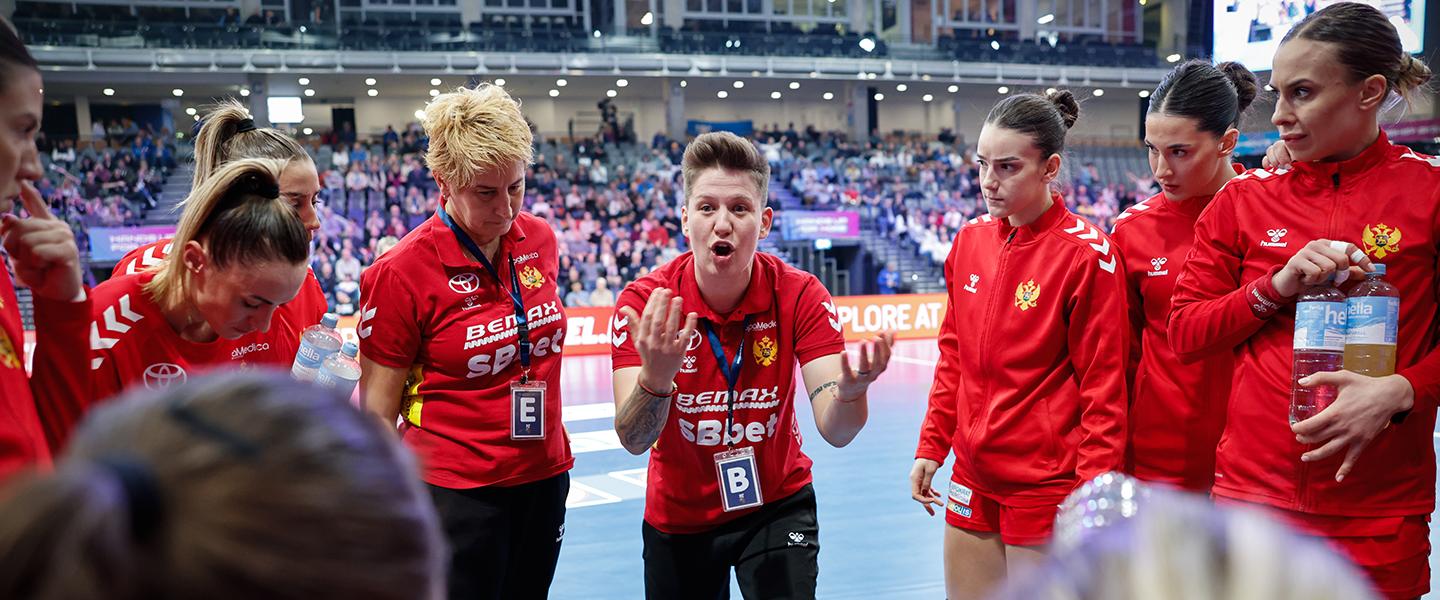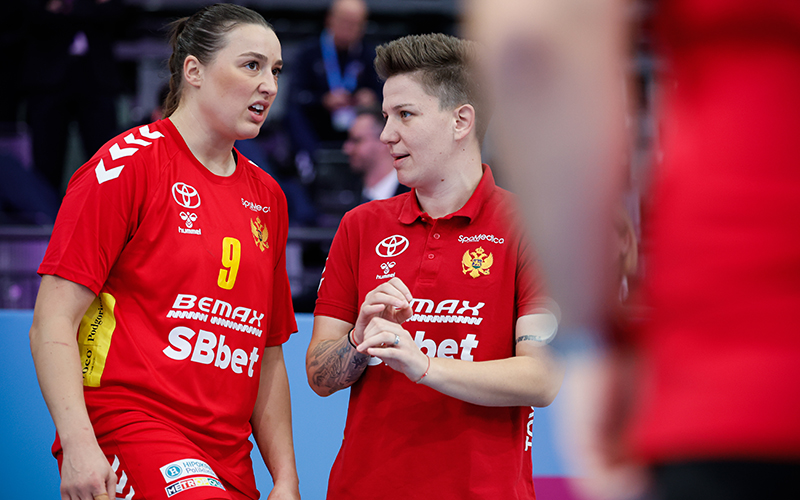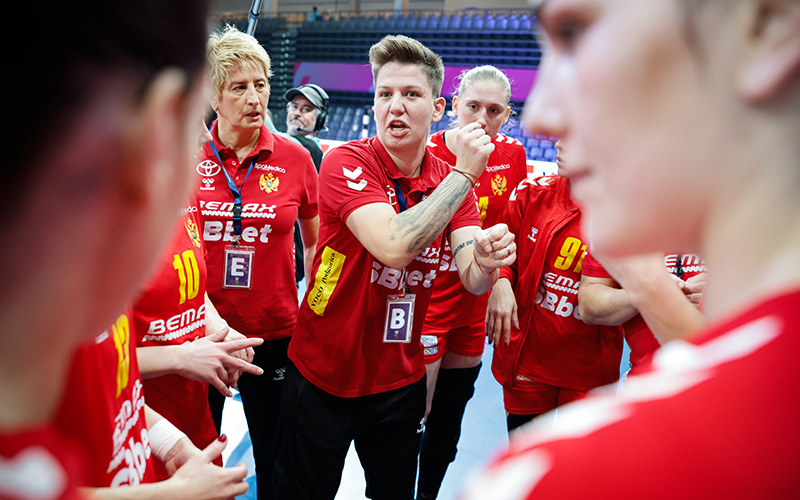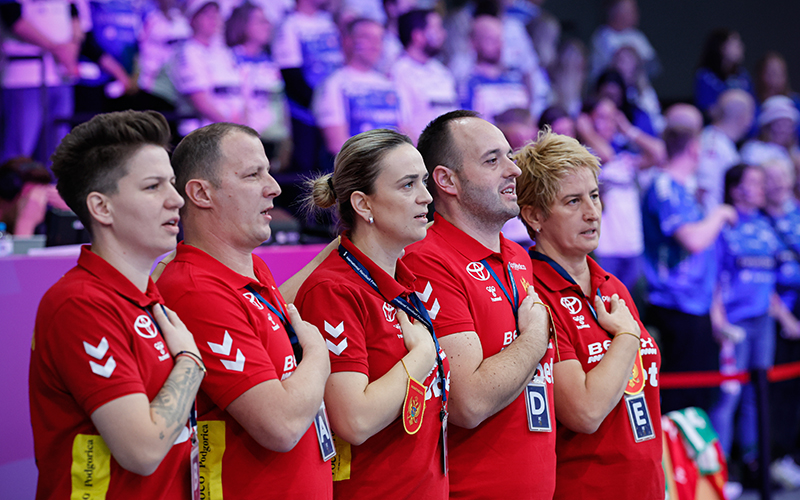Another day, another challenge, another dream for Montenegro coach Lazović
27 Nov. 2025

After handing IHF Women’s World Championship debutants Faroe Islands a 32:27 defeat on the opening day of action in Trier, Montenegro’s players grabbed the nearest Zastava Crne Gore (flag of Montenegro) and proudly posed and celebrated with it in front of their fans who had come to the SWT Arena to help get their Germany/Netherlands 2025 campaign underway.
And this was just after the first game of what could be a near three-week tournament for the European side should they make it to the final weekend and medal round.
If they do, it will mark the first time in eight attempts for the young nation, a fifth place their highest ranking in the event, a world championship medal eluding them, unlike the Olympic Games and European Championship.
Montenegro coach Suzana Lazović has one each of those medals; a silver from the London 2012 Olympic Games and gold from the 2012 European Championships, the line player playing under legendary coach Dragan Adzic in a golden era for Montenegrin women’s handball which also saw her club side Buducnost win the EHF Champions League Women.
“We're missing this medal, but I really believe that in the future Montenegro can succeed with this task. I really believe it and this is one of the tasks for us. We are here. We will give everything and everything is possible in life,” says a focused and passionate Lazović to ihf.info following that opening day win.
“It depends on the luck with who you have in the main round, then the quarter-final, but Montenegro already has the medal history and I'm sure that in the future we will continue with this. Maybe not now, maybe yes now, or maybe in a few years, but I'm sure that these players can finish their career with this medal – the one we are missing.”

The passion for Montenegro emanating from the fans, players and coaches of Montenegro over the years has never waned and is in such evidence in the 33-year-old that she cannot find the words in any language to describe how she felt when walking out at her first IHF World Championship as head coach of the senior national team.
“When you represent your country, and you have the success you dream of, when you hear the national anthem and touch your flag, especially in this first match as coach it’s an emotion I cannot explain in English or in my own language,” says the player who played her entire club career for Buducnost, based in the Montenegro capital, Podgorica.
“It is just natural emotions; your body can all be really down but your hear this and it gives you a power where you feel like you can do anything and everything in your life.”
After a spell coaching China to the top 16 of the 2024 IHF Women's Junior World Championship as part of the IHF New Markets Project, combined with time with the younger age Montenegro side, Lazović now finds herself in her dream role.
“It’s my first time, and I am happy that I have chance to represent my country,” she says.
“When I worked in China and went with them to the world championship it was at that moment, I realised that my dream was to represent my country at one future championship. I like and respect China but it was different with them. Every coach has a dream of being national team coach for their country; it's not the same if you hear another national anthem to the one from where you're born and where your family is. Believe me, when I was for the junior competition with the China team, at that world championship, I went and watched Montenegro and in that moment my tears are coming.”
This raw emotion was always evident on court when Lazović played.

Instantly recognisable through her cropped hair, sometimes dyed, sometimes not, sometimes both, but predominantly through her incredible ability to find space on the line to sink home crucial strikes and defend like her life was on the line – and the passion, emotion and use of all methods to get the win.
Now, she is on the other side of the line, but a picture of control and peace.
“People don't know the real me. If they compare how I was as a player to how I am as a coach, they will see that it is totally different. When I was a player, I was crazy. When I'm coaching, I try to be calm,” says Lazović, who is also coaching Alba Fehérvár in Hungary.
“A lot of coaches I have had experience with, like Dragan, I look at them now as a coach, I know that it was so hard to work with me as a player but all of our dreams, as players, as coaches, is to go to the Olympic Games and I'm sure as a coach that I will succeed. It doesn't matter when, but I will follow this.
“I'm with Montenegro because I believe that the Montenegro team can come again in the future and this world championship is important for us. If you want success to come, one big dream, you have to come with the small steps and maybe the result from this world championship is not important, but for our experience, for how we will play, it's one big step and a big help for this future success.”
Any future coaching success for Lazović will have its roots not only in the Balkan nation, but in one of the world’s most populous countries, after what proved to be a defining period for the coach, one in which she learned basic Chinese to help find success.
“That means that you enjoy it there, that you're happy, and that you want to help with them,” she says about learning the local language. “If I was saying something in a time-out or during the match to the players, the (Chinese) translator had to translate, and because any match is a living situation, that lost three seconds is important for the players and the situation has already moved on.

“I decided to learn some basic these things so in handball language, I could tell everything to the players. If you ask a person fluent in Chinese, maybe my Chinese is not perfect, but what was important is that the players understood what I wanted from them.”
And it worked, as her adopted nation beat Czechia and Algeria in the preliminary round and the hosts North Macedonia in the placement round to finish 15th, their highest ranking in the competition for nearly 20 years. The experience also saw Lazović learn more than words.
“The Balkan system, Balkan temperament and character, is so different [to China]. I learned that I should enjoy handball more, that I should be happy as a coach, as a person and not put a lot of pressure lot on yourself and expectation, that I should enjoy in every moment and learn from every moment; every mistake and every good situation,” she explains with a laser-like focus.
“Before, I was not patient with the players but I learned I should be more patient, because the system functions differently there and you should adapt to it. You cannot come in straightaway and change to the Balkan system. No, it's not possible. Not in China. I adapted.
“They're really good people and I'm so proud and happy that some of the players from my generation then are now at this world championship. That's the meaning now for me as a coach: that I do a good job for them, and I promise to them that in the future, we will have the chance to work again together.”
The interview is fascinating as Lazović expands on working in Hungarian, English, Chinese and her own language and the complications that come with it (“I try to understand Hungarian, but sometimes I come to training and have to remember what language to speak”), plus juggling multiple lives – in Hungary, in Montenegro, on the road and in and out of handball (“this is hard, but a big experience and I'm young so challenges are good, all my life has been a challenge, but family is priority, I have a daughter”) and managing players after games (“some players want total rest, some don’t want to talk, some don’t want to run, some want the gym – every person is individual”).
But the last words go to her captain Đurđina Jauković, who can best sum up the effect her former teammate has had on the national team.
“I'm so happy that we have her and we were so happy when she was announced,” says the CSM București left back. “In one way, we are playing for us, but also for her. She's doing a great job and I have huge respect for her.
“Yes, she was my teammate and my roommate too and outside of the handball court we can be friends, but on the court, she's my coach, and I have full respect for her and she is like this too. She's so open that we can come to talk with her about everything, not just about handball and we appreciate this a lot. We are thankful for everything she's doing for us.”

